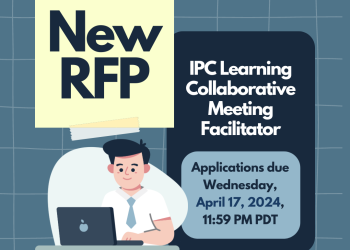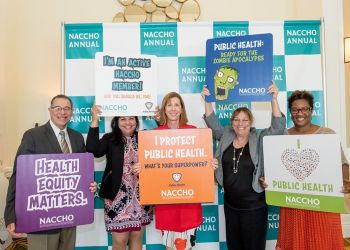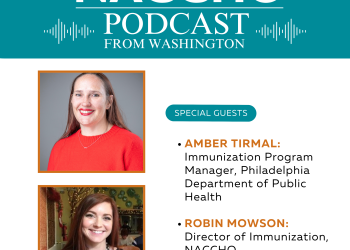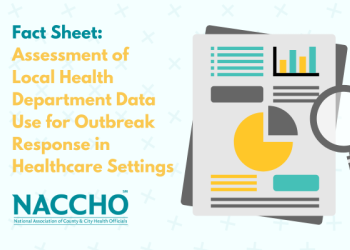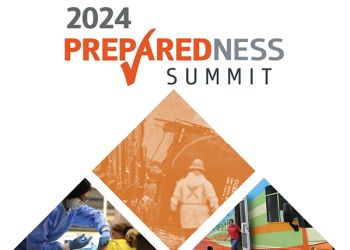— Public Health Projects in Arkansas, California, New Hampshire, Ohio, South Carolina, and Utah Receive Funding for Academic Detailing on Harm Reduction —
Washington, DC, March 23, 2023 — The National Association of County and City Health Officials (NACCHO), representing the country’s nearly 3,000 local health departments, has awarded almost $360,000 in funding to six sites as part of the Harm Reduction and Academic Detailing project. Each site will receive up to $60,000. Harm reduction is a set of practical strategies and ideas aimed at reducing negative consequences associated with drug use and is a movement for social justice built on a belief in, and respect for, the rights of people who use drugs. Harm reduction strategies are critical to reducing the morbidity and mortality of people who use drugs; these strategies encompass a broad array of practices and services that can reduce substance use, connect people to treatment, and prevent overdoses.
Academic detailing is an established one-on-one educational outreach technique that has been shown to effectively change the behavior of healthcare providers. Providers may include physicians, pharmacists, EMS responders, and staff of Federally Qualified Health Centers (FQHCs), walk-in clinics, urgent care facilities, etc.
With support from the Centers for Disease Control and Prevention (CDC), six sites have been selected to pilot key harm reduction messages through academic detailing. They will conduct academic detailing with populations that each site selected as a priority for their jurisdiction, including EMS, staff of FQHCs, Medications for Opioid Use Disorder (MOUD) providers, and local officials. The awardees’ objectives are to increase knowledge of harm reduction among the populations being detailed, strengthen their ability to incorporate harm reduction into the services they provide or role in their community, and increase referrals for people who use drugs to harm reduction services in their community. The awardees are:
ALOSA HEALTH & COLUMBUS PUBLIC HEALTH, OHIO; $60,000
Alosa Health received a grant of $60,000 to inform participants from primary care offices, FQHCs, walk-in clinics, urgent care facilities, and pharmacies of existing resources that can better support patients who use drugs. With input from community stakeholders/people with lived experience, Alosa will disseminate information on a variety of topics, including: state-level policies on opioid prescribing and dispensing, payor-specific issues, The Columbus & Franklin County Addiction Plan Coalition, and harm-reduction services.
Through this project, Alosa Health will specifically work in Franklin County, which has a higher proportion of individuals living with opioid use disorder as compared to the state of Ohio as a whole.According to the Columbus & Franklin County Addiction Plan, Franklin County had 788 overdose deaths linked to substance use and 5,729 Substance Use Disorder/Opioid Use Disorder-related hospitalizations in 2021, the most recent year for which data is available.
THE UNIVERSITY OF UTAH, UTAH; $59,995
The Utah Naloxone program (UN) housed within the University of Utah has been awarded $59,995 to work closely with rural and urban EMS partners, local harm reduction providers, and people with lived experience to develop key messages for rural EMS providers to improve statewide harm reduction capacity. Utah Naloxone will conduct listening sessions and focus groups with community partners to identify harm reduction perceptions, themes, and educational opportunities to help develop key messages that will enhance rural EMS knowledge of harm reduction and improve rural EMS responders’ ability to incorporate harm reduction into services they provide. Utah Naloxone will also develop a local resource guide, in collaboration with the Utah Department of Health and Human Services, to identify and share Utah’s community resources with rural EMS providers.
The work of this pilot is important, as drug poisoning deaths are the leading cause of injury death in Utah, accounting for 30 percent of all injury deaths in 2020. Specifically, rural regions of Utah have especially high rates of drug deaths when compared to the rest of the state (Public Health Indicator Based Information System (IBIS), 2021).
VELNONART TRANSFORMATIVE HEALTH, CALIFORNIA; $58,500
VelNonArt Transformative Health (VTH) has received $58,500 to develop and implement academic detailing key messages in FQHCs in Los Angeles County. VTH leaders will leverage their existing connections with FQHCs in Los Angeles County and relationships with harm reduction coalitions to guide their recruitment and academic detailing program. As a syringe service provider (SSP) in Los Angeles County, VTH will conduct a needs assessment with these providers, which will be used to inform the design of the key messages. More specifically, VTH will provide education focused on addressing racial disparities, combating health inequities, and reducing the stigma attached to people who use drugs and people experiencing homelessness within racial and ethnic minority groups and other underrepresented communities. With support and guidance from people with lived experiences, VTH will also disseminate resources/information on a variety of topics, including overdose response and prevention, Narcan distribution, Bay Area Addiction Research and Treatment Center clinics (methadone) and safer use supplies.
The work of this pilot is important as there was a “48% increase in accidental drug overdose deaths during the first five months of the pandemic compared to the same time period in 2019, with the highest accidental drug overdose deaths per 100,000 population being associated with methamphetamine and fentanyl,” (LA Public Health, 2021). The goal is to be a part of a paradigmatic shift in the way that many traditional healthcare providers view and treat people with substance use disorders.
THE UNIVERSITY OF ARKANSAS FOR MEDICAL SCIENCES; $60,000
Arkansas continues to have an opioid prescribing rate (82.6 per 100 people) that is nearly double the national average (43.3 per 100 people). Fatal overdoses increased from 352 in 2018 to 547 in 2020. Significant portions of Arkansas are rural (55 out of 75 counties), and rural areas often face significant barriers to accessing behavioral health services, often facing wait times of a month or more.
The University of Arkansas for Medical Sciences (UAMS) will provide academic detailing with FQHCs in rural Arkansas. UAMS will partner with the Community Health Centers of Arkansas (CHCA) to provide detailing to providers in counties with high opioid dispensing rates to decrease opioid and benzodiazepine prescribing, increase referrals to evidence-based pain management treatments (pharmacologic and non-pharmacologic), and increase awareness of local harm reduction resources.
UNIVERSITY OF NEW HAMPSHIRE; $60,000
New Hampshire has historically been and continues to be disproportionately affected by the ongoing opioid and synthetics overdose epidemic, consistently ranking among states in the highest percentile of overdose death rates based on per capita metrics since 2015. Despite increases in access to harm reduction resources and services, New Hampshire’s public health infrastructure is inadequately equipped to respond to and allay this ongoing public health crisis. Overdose death rates have remained above 30 per 100,000. New Hampshire hospitals have documented high rates of emergency department visits and inpatient admissions for bacterial infections related to injection drug-use
Not all syringe services programs in New Hampshire have received the support from community entities required to scale to the needs of people who use drugs. A lack of understanding of harm reduction strategies may be a cause of New Hampshire’s minimal public health structure in this area. University of New Hampshire seeks to increase awareness and education about harm reduction with community officials to better understand the needs of people who use drugs within their communities and strategies that reduce drug-related harms. They will provide harm reduction education to municipal staff and elected officials who have expressed interest in harm reduction, with goals that participants will adopt use of person first language, increase understanding of the factors that underpin substance use, increase their understanding about the public health/financial benefits of harm reduction, establish mechanisms to meaningfully incorporate people who use drugs, and support agency officials in their decision-making.
UNIVERSITY OF SOUTH CAROLINA SCHOOL OF MEDICINE - GREENVILLE; $60,000
From 2019 to 2020, the total number of opioid-involved overdose deaths in South Carolina increased by 59 percent, from 876 to 1,400. The total number of all drug overdoses increased by 53 percent across the state, from 1,131 to 1,734. The South Carolina Epidemiologic Profile of HIV, AIDS, and Sexually Transmitted Infections 2020 notes that SC ranks high for poverty, low educational attainment, and uninsured population compared to other states -- factors that can affect people’s ability to access prevention and health care services and adhere to regimens for treatment and care of diseases, including substance use disorder.
Prisma Health at the University of South Carolina School of Medicine will provide academic detailing for new MOUD providers at fixed sites -- an emergency department in Laurens, SC, a county jail in Oconee, SC, and mobile access points in Abbeville, Greenwood, Laurens, and Oconee, SC. The detailers will focus on increasing knowledge about resources and services for people who use drugs, including harm reduction and MOUD. Additionally, this program will focus on increasing use of motivational interviewing to assess and support readiness to change; increasing provision of naloxone for people who use drugs and their families; and increasing provision of sterile syringes, as well as supporting the proper disposal of used syringes and drug testing supplies.
###
About NACCHO
The National Association of County and City Health Officials (NACCHO) represents the nation’s nearly 3,000 local governmental health departments. These city, county, metropolitan, district, and tribal departments work every day to protect and promote health and well-being for all people in their communities. For more information about NACCHO, please visit www.naccho.org.
